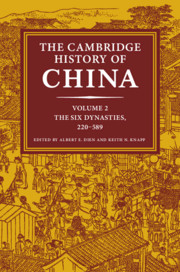Book contents
- The Cambridge History of China
- Copyright page
- Contents
- Figures and Tables
- Maps
- Preface
- Six Dynasties Chronology
- Introduction
- Part 1 History
- Chapter 1 Wei
- Chapter 2 Wu
- Chapter 3 Shu-Han
- Chapter 4 Western Jin
- Chapter 5 Eastern Jin
- Chapter 6 The Sixteen Kingdoms
- Chapter 7 Cheng-Han State
- Chapter 8 Northern Wei
- Chapter 9 Eastern Wei–Northern Qi
- Chapter 10 Western Wei–Northern Zhou
- Chapter 11 The Southern Dynasties
- Part 2 Society and Realia
- Part 3 Culture, Religion, and Art
- Abbreviations of Frequently Cited Primary Sources
- Journal Titles: Acronyms (single-word titles do not use acronyms)
- List of Asian Journal Titles
- Primary Texts
- General Bibliography
- Glossary–Index
Chapter 3 - Shu-Han
from Part 1 - History
Published online by Cambridge University Press: 28 October 2019
- The Cambridge History of China
- Copyright page
- Contents
- Figures and Tables
- Maps
- Preface
- Six Dynasties Chronology
- Introduction
- Part 1 History
- Chapter 1 Wei
- Chapter 2 Wu
- Chapter 3 Shu-Han
- Chapter 4 Western Jin
- Chapter 5 Eastern Jin
- Chapter 6 The Sixteen Kingdoms
- Chapter 7 Cheng-Han State
- Chapter 8 Northern Wei
- Chapter 9 Eastern Wei–Northern Qi
- Chapter 10 Western Wei–Northern Zhou
- Chapter 11 The Southern Dynasties
- Part 2 Society and Realia
- Part 3 Culture, Religion, and Art
- Abbreviations of Frequently Cited Primary Sources
- Journal Titles: Acronyms (single-word titles do not use acronyms)
- List of Asian Journal Titles
- Primary Texts
- General Bibliography
- Glossary–Index
Summary
Situated in the southwest, bounded by mountains and watered by the Yangzi and several tributaries, the region occupied by the former Warring States-period state of Shu was secure and rich in both agricultural and mineral resources. An abundant supply of copper and tin had led to the rise of a bronze-producing society at Sanxingdui, contemporary with the Shang at Anyang (c.1200 bce), and later, salt, iron, and natural-gas deposits were developed into thriving industries during the late Zhou period. Moreover, quality soil, easy access to water, and a warm and lengthy growing season made the region highly productive in terms of agriculture. After Shu was conquered by Qin in the third century bce, a large number of families from the Central Plains were relocated to the area to provide material support for the Qin war effort. It was due in no small measure to the resources extracted from Shu that Qin was able to conquer and unify China by 221 bce.
- Type
- Chapter
- Information
- The Cambridge History of China , pp. 66 - 78Publisher: Cambridge University PressPrint publication year: 2019

